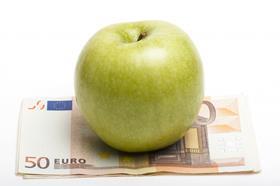
The current weakened status of the pound against the euro may be good news for exporters of fresh produce as it means sterling prices are currently more competitive in Europe. On the other hand, imports have become more expensive for retailers.
The Institute for Fiscal Studies (IFS) has highlighted that 30 per cent of food purchased in the UK is currently imported, mainly from the EU. The IFS states that “it is likely tariffs will be imposed” if the government fails to secure a free trade deal with Brussels. While this may present an opportunity to sell more into the UK as the supply chain feels the cost of imports, the scope of the market overseas is vital to the ongoing viability of many businesses.
Food and drink prices are rising across the UK and are largely driven by the increased cost of importing produce from overseas. In March this year, Sainsbury’s acknowledged the trend and stated that rising import costs could push prices even higher because the impact of cost-price pressure remains uncertain. For producers, this uncertainty is two-sided and relates both to the costs of selling at home and the longer-term uncertainty of continuing to export overseas if new tariffs and obstacles to trade are introduced.
It is too early to predict the outcome of Brexit, but for producers continuing to trade overseas, the prolonged uncertainty means that there are likely to be more fluctuations in the currency market to come. A foreign exchange policy may help to hedge foreign exposures against currency fluctuations. While it may be tempting to make hay while sterling prices remain competitive in Europe, if this changes it could have a major impact on the bottom line of any organisation looking to export fresh produce. One alternative would be to set up a forward contract that allows a business to fix a prevailing exchange rate for a period. This helps forecasting of costs within a financial year and may make it possible to manage prices and supplier expectations without taking a hit on their margin. Please note that a forward contract may require a deposit.
Another tactical measure that may form part of a foreign exchange strategy is a limit order. This allows a company to target a specific exchange rate and if this rate is achieved, a deal is automatically booked on the customer’s behalf. Techniques such as these, or methods such as setting up a currency account for import payments and using real-time data from online accounts, can help to maintain fixed costs.
The only thing that is certain is that the foreign exchange market will continue to fluctuate. In addition, the industry is expecting a measure of increased friction in trade as a result of Brexit. This is one of the reasons why it’s so important for organisations to plan ahead to mitigate the possible impact of currency fluctuations.



